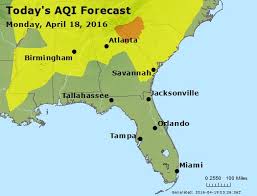CONTACT: Hilary Merlin | Mothers & Others for Clean Air, American Lung Association in Georgia | 678-465-8840 | hilary.merlin@lungse.org
Editor’s Note: Trend charts and rankings for metropolitan areas and county grades are available at stateoftheair.org
ATLANTA, Ga. (April 20, 2016) – The American Lung Association’s 2016 “State of the Air” report found metro Atlanta to have the cleanest air since the annual report was first issued in 2000, when Atlanta ranked #9 most polluted for ozone. The report showed improvements in both ozone and particle pollution levels. This is in keeping with a trend seen across the nation of lower pollution levels, thanks to stronger standards for pollutants and for the sources of pollution.
Each year the “State of the Air” reports on the two most widespread outdoor air pollutants, ozone pollution and particle pollution. The report analyzes particle pollution in two ways: through average annual particle pollution levels and short-term spikes in particle pollution. Both ozone and particle pollution are dangerous to public health and can be lethal.
The metro area improved with lower ozone levels and ranked 52nd for most polluted city for ozone in the nation, better than 33rd in 2011-2013. These improvements do not mean that the air is clean enough. Fulton County, the most polluted county in the metro area, had a weighted average of 9.5 days of unhealthy levels of ozone.
“Ozone is harmful to public health and especially children, older adults and those with asthma and other lung diseases. When older adults or children with asthma breathe ozone-polluted air, too often they end up in the doctor’s office, the hospital or the emergency room” said June Deen, Senior Vice President of Public Policy and Health Promotions of the American Lung Association of the Southeast.
Ozone pollution has decreased, nationwide because the nation has cleaned up major sources of the emissions that create ozone, especially coal-fired power plants and vehicles. However, according to research, climate change causes warmer temperatures, which makes ozone harder to clean up. A factor in future pollution reduction efforts.
The metro area improved to its lowest level ever for year-round particle pollution, now meeting the national standard for the first time. Metro Atlanta tied for 44th most polluted, an improvement over the 18th most polluted that Atlanta held in the 2014 report. For short-term particles, Gwinnett County, GA, became the most polluted county in the metro area, with a weighted average of 0.3 unhealthy days (B grade). Previously, DeKalb and Fulton Counties were the most polluted counties. This is their best ever weighted average on record.
“Particle pollution is made of soot or tiny particles that come from coal-fired power plants, diesel emissions, wildfires and wood-burning devices. These particles are so small that they can lodge deep in the lungs and trigger asthma attacks, heart attacks and strokes, and can even be lethal,” said Deen. “Year-round particle pollution levels have dropped thanks to the cleanup of coal-fired power plants and the retirement of old, dirty diesel engines.”
Elsewhere in Georgia, Brunswick, Rome, Savannah and Valdosta made the list of the cleanest U.S. cities for short-term particle pollution and/or ozone pollution. Learn more about the rankings, as well as air quality across Georgia and the nation in the 2016 “State of the Air” report at stateoftheair.org. For media interested in speaking with an expert about lung health and healthy air, contact the American Lung Association in Georgia at june.deen@lungse.org or 770.544.0520.
###
About the American Lung Association
The American Lung Association is the leading organization working to save lives by improving lung health and preventing lung disease, through research, education and advocacy. The work of the American Lung Association is focused on four strategic imperatives: to defeat lung cancer; to improve the air we breathe; to reduce the burden of lung disease on individuals and their families; and to eliminate tobacco use and tobacco-related diseases. For more information about the American Lung Association, a holder of the Better Business Bureau Wise Giving Guide Seal, or to support the work it does, call 1-800-LUNGUSA (1-800-586-4872) or visit: Lung.org.





